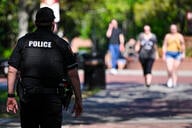You have /5 articles left.
Sign up for a free account or log in.
In the weeks and months following Monday’s shocking bombing at the Boston Marathon, in which three people were killed -- including one graduate student at Boston University -- and 170 wounded, colleges across the country will revisit their security measures to make sure they’re doing everything possible to ensure safety at their major sporting and other events.
And they should, said James Forest, an associate professor and director of the security studies graduate degree program at the University of Massachusetts at Lowell. But they should also recognize that when it comes to terrorism, there’s only so much security measures can do.
“There is no 100 percent security possible in this world. Terrorists are humans, and humans figure things out; they figure out ways to overcome obstacles,” Forest said, noting that safety precautions do not help gather intelligence or undermine the ideology that drives terrorists. “Any college or university that doesn’t understand the notion of terrorism ... is just setting itself up for a bunch of terror.”
President Obama on Tuesday morning called the bombings an “act of terrorism.” It remains unclear who is responsible, but Department of Homeland Security officials said Tuesday there’s no evidence that the bombings are part of a wider plot. That will be key in whether college officials make any concrete changes in response, said Lou Marciani, director of the National Center for Spectator Sports Safety and Security at the University of Southern Mississippi, which provides safety certification to organizations (including colleges) that own sports venues.
“If it’s a plot that could go further than the race, then I think you’re going to see beefed up security immediately,” he said, adding that at this time of year there aren’t too many high-traffic events on campuses (unlike fall's football games or arenas full of basketball fans in the just-finished NCAA tournaments). “Graduation is something they would be cautious about; other than that, unless it’s a plot, I think things will be pretty normal.”
Pennsylvania State University announced Tuesday that no bags, umbrellas, footballs or purses would be allowed inside any campus venues hosting events through Sunday, including the football stadium. This weekend is Penn State's annual "Blue-White Weekend," which includes a carnival, football scrimmage and 20 other events. Police will also increase surveillance and security sweeps.
"While not permitting any bags into Beaver Stadium is a significant change from our ordinary routine, it is an important additional layer of security that we are instituting for this event. It brings us in line with most other stadiums across the nation," Steve Shelow, Penn State's assistant vice president for police and public safety, said in a statement.
And the National Collegiate Athletic Association said in a statement, "All of our NCAA championships have existing safety and security plans, and we are working with our host institutions as well as law enforcement to ensure the proper safeguards are in place for upcoming NCAA championships in the greater Boston area, as well as across the country."
Depending on the magnitude of the event, it doesn’t always matter whether it’s isolated. After the Sept. 11, 2001, terrorist attacks, colleges (and other institutions) throughout the country tightened security.
The University of Michigan’s list of prohibited items at football games “grew substantially” after the Sept. 11 attacks, going so far as to ban bags of any size and type, said Diane Brown, public information officer at Michigan’s police department and division of public safety. As security protocols around the country eased somewhat in the following years, Michigan followed suit, allowing fanny packs, but then the winds shifted again and the university reverted to its bag ban in the wake of a 2009 terrorism probe that led to arrests.
“When there are incidents then the prudent thing is to look at, what do you have coming up and how might that inform that?” Brown said. “But we also look at the totality across the country of what’s happening, especially at large stadium venues and campuses.”
At least a dozen or so Boston-area college students were injured in the bombings, according to news reports.
Although events like football games and (depending on where they take place) commencements can have the advantage of a controlled attendance in a confined space, most campuses are still open, public spaces, so in that sense they’re no less vulnerable than downtown Boston. Several campuses – including the University of Oregon and Marshall University – either host marathons or are part of a local marathon route.
However, most colleges have done a better job -- since Sept. 11 and in the wake of multiple campus shootings -- of having emergency response plans and conducting risk assessments to identify their vulnerabilities, said Michelle Majewski, dean of the School of Criminal Justice at Marian University and editor of the Journal of Homeland Security Education.
“Does that mean something still can’t happen? No, it doesn’t because there’s no way we can anticipate every single threat that might take place,” she said. “It’s a reminder that we all need to pay attention to this and we need to have plans in place, we need to practice those plans, and we have to have exceptional communication. That’s key when an event like this unfolds – really well-thought-out communication plans are essential.”




